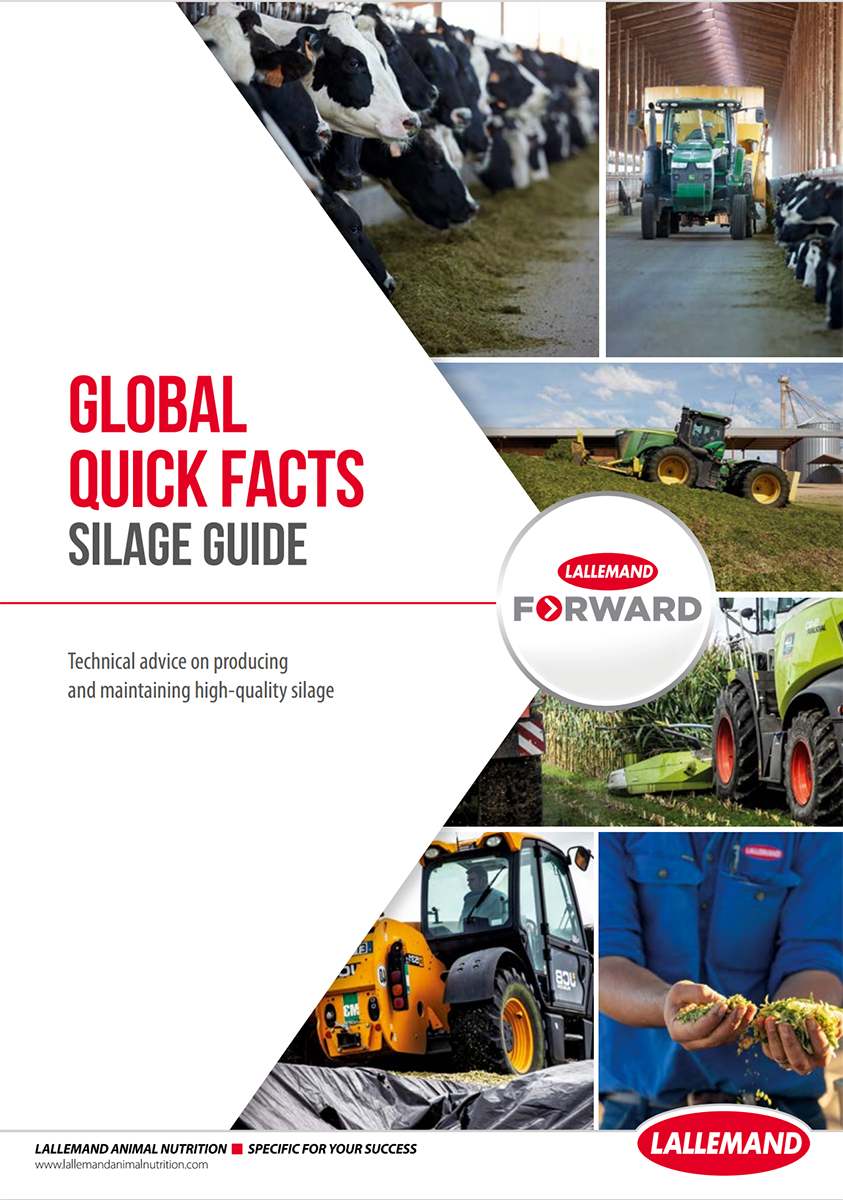MAGNIVA Forage Inoculant

Lowers pH quickly
Specific and unique strains of Lactobacillus bacteria found in MAGNIVA Silage Inoculants quickly and efficiently preserve the silage, by quickly increasing lactic acid levels and lowering the pH to a safe level. This maintains silage nutrient and energy levels and minimizes DM losses.

Improves aerobic stability
MAGNIVA Platinum Silage Inoculants improves the aerobic stability of the silage when opened, actively inhibiting undesirable yeast and mold growth, reducing heating, spoilage and significantly reducing dry matter losses.

Lessens energy losses during fermentation and feedout
Inhibiting development of undesirable microorganisms with MAGNIVA Silage Inoculants helps retain the full nutritional and energy values of your silage, meaning when fed to animals, the silage will be of optimal quality to drive performance.
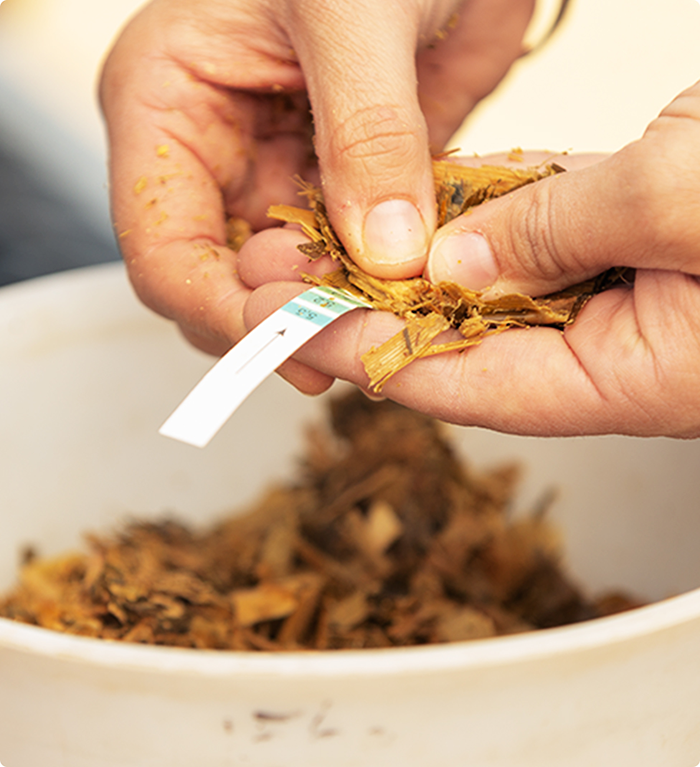
Managing feed costs is crucial to achieving on-farm profitability
Conversion of forage to silage produces a long term stable feed that gives the farmer the flexibility to produce more, while cutting the cost of production.

Lentilactobacillus hilgardii CNCM I-4785
We discovered a gamechanger strain of silage inoculant
What producers are saying about MAGNIVA
“In trials, wholecrop silage was ensiled with either no inoculant or with MAGNIVA Platinum. The MAGNIVA inoculant kept the silage much cooler for the whole period, meaning more energy would be available to feed.”
Name: Bury Barton Farm
Location: Lapford, UK
Size: 100 mainly Limousin suckler cows
Inoculant: MAGNIVA Platinum
Producing and utilising high-quality silage is central to success for a beef unit in mid-Devon. Andrew Quick and his son Edward farm 400 acres at Bury Barton Farm, Lapford, which is home to 100 mainly Limousin suckler cows split into spring and autumn calving groups and 500 ewes. Mainly down to grass, they also grow 60 acres of spring barley for wholecrop, 30 acres of forage maize and 70-80 acres of cereals. They finish all the suckler calves, which are weaned at 8 months and will finish at 16-18 months. They also buy in mainly British Blue and Limousin steers and a few heifers at around five months old. In total, they finish around 250 cattle per year. Home-bred animals and bought-in steers are targeted at a 370kg carcase, while bought-in heifers go at around 330kg carcass weight. Quality silage is at the heart of the system. The Quicks make fermented wholecrop cereals, maize and grass silage, which form the basis of growing and finishing rations that which typically comprise one third of each forage. First cut grass is taken in late May with a second cut in mid-June. Second cut is used for the suckler cows and is allowed to become more stemmy. “Silage is a big investment for us so we focus on making the best quality we can and also on reducing waste,” Andrew explains. “The more high-quality forage we can feed, the lower our overall costs. Silage waste just pushes up costs because all the investment in making silage is related to the feed we put in the clamps, not what we feed out. So, we do all we can to waste as little as possible.” Andrew targets making all forages at above 30% dry matter. Growing cattle are fed 17-18kg of mixed silages per day while the finishers will get 20kg/day. Both groups are also fed home grown wheat, but Andrew doesn’t feed any purchased protein as there is enough in the grass silage. “One of our priorities when making silages, particularly wholecrop and maize, is achieving good aerobic stability,” Andrew continues. “We feed out once a day, so we need the forages to keep cool and fresh to ensure we achieve high intakes. “We also need the clamps to stay cool in the summer when we are using less as we have more cattle out at grass, which means we go across the clamp slower. A face exposed for a long time in heat could lead to increased problems with heating, which reduces intakes and feed value as heat is just energy being burnt up.” To help minimise waste and aerobic spoilage, Andrew has been working with Steve Symons from Lallemand Animal Nutrition and in 2019 used MAGNIVA inoculants on the wholecrop and maize. “There are two key objectives when making silage, whatever the crop,” Mr Symons comments. “The first is to achieve a rapid initial fermentation and pH drop while the second is to keep the crop stable once it is opened. “Magniva Platinum crop and condition specific forage inoculants, which supersede the Biotal range, combine the proven strain L buchneri 40788 with the totally new patented bacterium L Hilgardii I-4785. They deliver the rapid initial fermentation and then quickly produce a number of antifungal compounds to knock back the yeasts and moulds responsible for heating, improving immediate aerobic stability, meaning clamps can be opened sooner. They also improve longer term aerobic stability, protecting the silage while the clamp is open. “In trials wholecrop silage was ensiled with either no inoculant or with Magniva Platinum Wholecrop. The Magniva inoculant kept the silage much cooler for the whole period, meaning more energy would be available to feed. “With margins continuing to be squeezed, focusing on maximising the use of high-quality forage will be crucial for beef producers,” he concludes.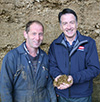
Andrew Quick
Beef producer
“In trials, wholecrop silage was ensiled with either no inoculant or with MAGNIVA Platinum. The MAGNIVA inoculant kept the silage much cooler for the whole period, meaning more energy would be available to feed.”
Name: Bury Barton Farm
Location: Lapford, UK
Size: 100 mainly Limousin suckler cows
Inoculant: MAGNIVA Platinum
Producing and utilising high-quality silage is central to success for a beef unit in mid-Devon. Andrew Quick and his son Edward farm 400 acres at Bury Barton Farm, Lapford, which is home to 100 mainly Limousin suckler cows split into spring and autumn calving groups and 500 ewes. Mainly down to grass, they also grow 60 acres of spring barley for wholecrop, 30 acres of forage maize and 70-80 acres of cereals. They finish all the suckler calves, which are weaned at 8 months and will finish at 16-18 months. They also buy in mainly British Blue and Limousin steers and a few heifers at around five months old. In total, they finish around 250 cattle per year. Home-bred animals and bought-in steers are targeted at a 370kg carcase, while bought-in heifers go at around 330kg carcass weight. Quality silage is at the heart of the system. The Quicks make fermented wholecrop cereals, maize and grass silage, which form the basis of growing and finishing rations that which typically comprise one third of each forage. First cut grass is taken in late May with a second cut in mid-June. Second cut is used for the suckler cows and is allowed to become more stemmy. “Silage is a big investment for us so we focus on making the best quality we can and also on reducing waste,” Andrew explains. “The more high-quality forage we can feed, the lower our overall costs. Silage waste just pushes up costs because all the investment in making silage is related to the feed we put in the clamps, not what we feed out. So, we do all we can to waste as little as possible.” Andrew targets making all forages at above 30% dry matter. Growing cattle are fed 17-18kg of mixed silages per day while the finishers will get 20kg/day. Both groups are also fed home grown wheat, but Andrew doesn’t feed any purchased protein as there is enough in the grass silage. “One of our priorities when making silages, particularly wholecrop and maize, is achieving good aerobic stability,” Andrew continues. “We feed out once a day, so we need the forages to keep cool and fresh to ensure we achieve high intakes. “We also need the clamps to stay cool in the summer when we are using less as we have more cattle out at grass, which means we go across the clamp slower. A face exposed for a long time in heat could lead to increased problems with heating, which reduces intakes and feed value as heat is just energy being burnt up.” To help minimise waste and aerobic spoilage, Andrew has been working with Steve Symons from Lallemand Animal Nutrition and in 2019 used MAGNIVA inoculants on the wholecrop and maize. “There are two key objectives when making silage, whatever the crop,” Mr Symons comments. “The first is to achieve a rapid initial fermentation and pH drop while the second is to keep the crop stable once it is opened. “Magniva Platinum crop and condition specific forage inoculants, which supersede the Biotal range, combine the proven strain L buchneri 40788 with the totally new patented bacterium L Hilgardii I-4785. They deliver the rapid initial fermentation and then quickly produce a number of antifungal compounds to knock back the yeasts and moulds responsible for heating, improving immediate aerobic stability, meaning clamps can be opened sooner. They also improve longer term aerobic stability, protecting the silage while the clamp is open. “In trials wholecrop silage was ensiled with either no inoculant or with Magniva Platinum Wholecrop. The Magniva inoculant kept the silage much cooler for the whole period, meaning more energy would be available to feed. “With margins continuing to be squeezed, focusing on maximising the use of high-quality forage will be crucial for beef producers,” he concludes.
Andrew Quick
Beef producer
“Our focus is on making the best quality silages we can as the basis for the ration. We also want to ensure that we feed as much as possible of the crop that goes into the clamp. MAGNIVA is keeping the clamp really cool, ensuring more of the energy gets into the cows.”
Name: Daniel family, Lower Rillaton Farm
Location: Callington in Cornwall, UK
Size: 160 dairy cows
Inoculant: MAGNIVA Platinum
Inoculants help drive forage efficiency
When your system is geared to turning home produced feeds into milk, forage efficiency is a key business objective. For the Daniel family from Lower Rillaton Farm, near Callington in Cornwall, ensuring effective fermentation and good stability is the foundation of their silage making. Jack Daniel runs the 350 acre farm with his father, Chris, and his sons, Matthew and Alex. The farm is home to 160 year-round calving cows averaging 8000 litres at 4.68% fat and 3.69% protein and the cropping is geared to feeding the stock on the farm. The cows are housed at night all year and graze by day in the summer. In addition to 230 acres of a mix of permanent pasture and grass reseeds, there are 30 acres of maize, 30 acres of wheat and 60 acres of barley, which is fed with a 25% double-mineralised protein concentrate. Diets are developed with Matt Dymond from Harpers Feeds and the cows are currently on 25kg grass silage, 10kg maize silage, 2.5kg treated wheat, 2kg of a soya/rape blend, straw, minerals and 5kg of bought-in fodder beet. This TMR gives M+16 litres with the barley/protein mix fed to yield through the parlour.Waste pushes up costs
“Our focus is on making the best quality silages we can as the basis for the ration,” Jack explains. “We also want to ensure that we feed as much as possible of the crop that goes into the clamp. Waste is just a drain on the business, pushing up costs.” Around 140 acres of first cut were taken in mid-May as they like a bit more fibre in first cut. Second cut of 110 acres was taken in late June with third and fourth cuts being baled. The family cut and rake the grass, before a contractor chops and clamps it. Chris Daniel rolls the clamp alongside the buck rake as they want good consolidation. First cut analysed at 27% DM and 11.8MJ ME/kg DM while second cut came in at 32% DM and 11.1MJ ME/kg DM. “Feeding grass all year round, we are after a rapid fermentation and a stable product as it takes us a week to get across the face in the summer and the clamps are outdoors and exposed to the elements.” This year they will move to the new MAGNIVA range of inoculants for grass Maize has been a central part of the system for many years and was drilled in mid-April under plastic. It was harvested in early October and treated with the new MAGNIVA Platinum inoculant.Less heating
MAGNIVA Platinum contains a unique combination of bacteria, L. buchneri and L. hilgardii, which quickly produce a number of antifungal compounds that significantly reduce the yeasts and moulds that cause heating, improving immediate aerobic stability, meaning clamps can be opened safely much sooner. They also improve longer term aerobic stability, protecting the silage while the clamp is open. By significantly reducing the populations of both yeasts and moulds, the antifungal compounds produced by the MAGNIVA inoculants reduce the main cause of the clamp heating and energy loss as well as reduced silage palatability. “Stability is really important for us,” Jack continues. “It takes us 4-5 days to work across the face and we don’t want to see the silage heating as this is just wasting energy and increasing our costs. We had concerns this year as we had a wet September and there were signs of Fusarium, which might have caused the clamp to heat up.” Steve Symons from Lallemand Animal Nutrition recently took infrared photographs of the clamp, and they show no signs of heating across the face. “MAGNIVA is keeping the clamp really cool, ensuring more of the energy gets into the cows. Temperature readings taken show the temperature eight inches behind the face was also consistent, a sure sign of excellent aerobic stability.”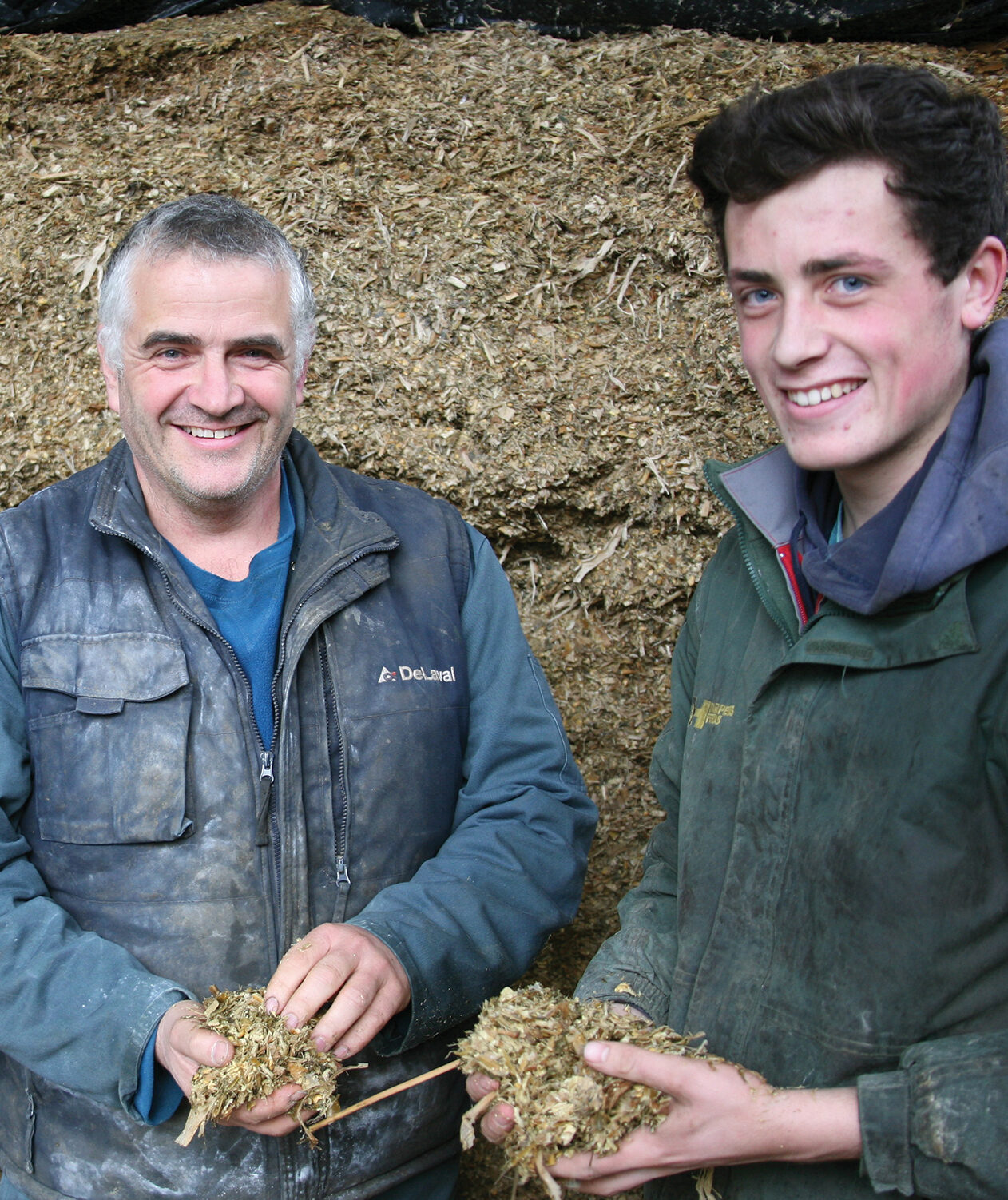
Jack Daniel
Dairy producer
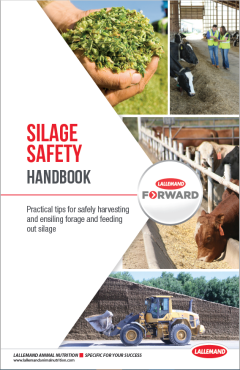
Silage Safety Handbook
